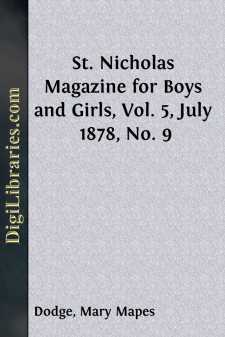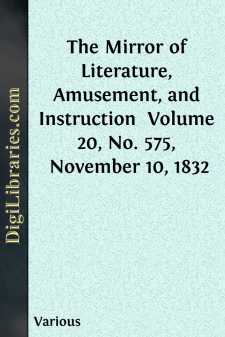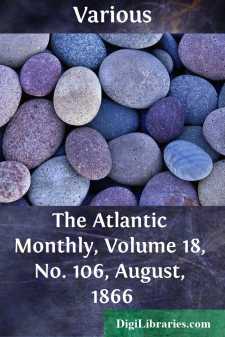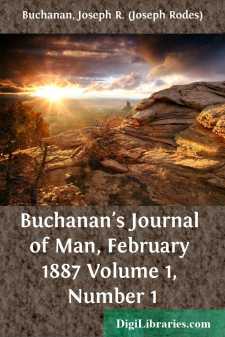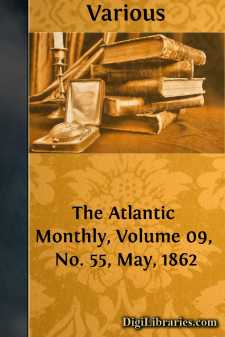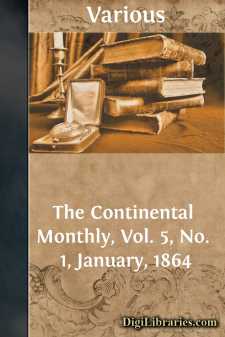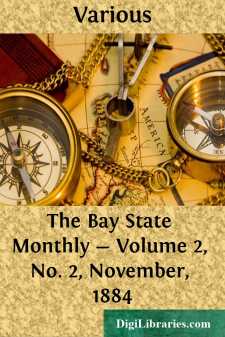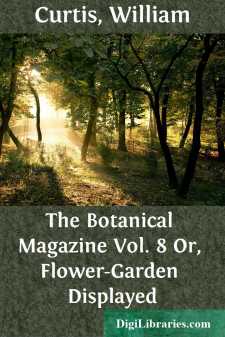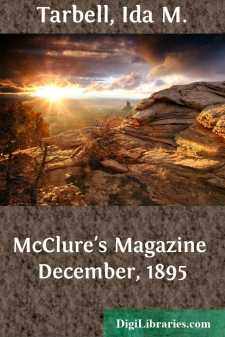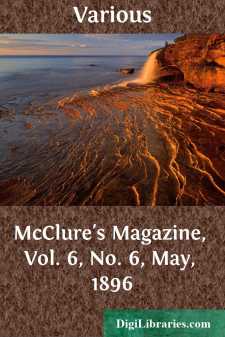Periodicals
- Art 27
- Children's periodicals 59
- Entertainment 5
- Food/Wine 2
- Games/Humor 455
- General
- Health 1
- History 53
- House/Home 1
- Regional 62
- Science/Nature 118
- Transportation 10
General Books
Sort by:
by:
Mary Mapes Dodge
THE GIRL WHO SAVED THE GENERAL.By Charles H. Woodman.Far down the Carolina coast lies the lovely island of St. John, where stood, one hundred years ago, a noble brick-built mansion, with lofty portico and broad piazza. Ancient live-oaks, trembling aspens, and great sycamores, lifted a bower over it to keep off the sun. Threading their way through orange-trees and beds of flowers, spacious walks played...
more...
by:
Various
SPIRIT DRINKING. "Nothing like the simple element dilutes The food, or gives the chyle so soon to flow." The direful practice of spirit-drinking seems to have arrived at its acme in the metropolis. Splendid mansions rear their dazzling heads at almost every turning; and it appears as if Circe had fixed her abode in these superb haunts. Happy are those who, like Ulysses of old, will not partake...
more...
by:
Various
HOW MY NEW ACQUAINTANCES SPIN. The strictly professional man may have overcome his natural aversion to some of the most interesting objects of his study, such as snakes, and toads, and spiders, and vermin of all kinds; but people in general have always required that any attempt to force such abominations upon their notice should be preceded by a more or less elaborate and humble acknowledgment of their...
more...
Published from 1849 to 1856 at Cincinnati, is to be re-established at Boston in February, 1887. When published formerly it was in its character and merits entirely unique, and, notwithstanding the progress of thirty-five years, its position is still unique, and in its essential characteristics different from all nineteenth century literature, and not in competition with any other publication. It was...
more...
by:
Various
MAN UNDER SEALED ORDERS. A vessel of war leaves its port, but no one on board knows for what object, nor whither it is bound. It is a secret Government expedition. As it sets out, a number of documents, carefully sealed, are put in charge of the commander, in which all his instructions are contained. When far away from his sovereign, these are to be the authority which he must obey; as he sails on in...
more...
by:
Various
RETROSPECTIVE. Time makes many dark things clear, and often in a wonderfully short and decisive way. So we said hopefully two years and more ago in regard to one of the unsolved problems which then pressed on the minds of thoughtful men—how, namely, it was to fare with slavery in the progress and sequel of the war. The history of our national struggle has illustrated the truth and justified the hope....
more...
by:
Various
GROVER CLEVELAND.By HENRY H. METCALF.Save only that of Ulysses S. Grant, no name in America has come from comparative obscurity into national eminence in so short a time as that of GROVER CLEVELAND. The fame of Grant was wrought out through the exigencies of a great civil war, in which the unity of the Republic was the issue involved. The distinction which Cleveland has achieved comes of valiant...
more...
by:
William Curtis
Lathyrus Articulatus. Jointed-Podded Lathyrus. Class and Order. Diadelphia Decandria. Generic Character. Stylus planus, supra villosus, superne latior. Cal. laciniæ superiores 2-breviores. Specific Character and Synonyms. LATHYRUS articulatus pedunculis subunifloris, cirrhis polyphyllis; foliolis alternis. Linn. Syst. Veg. ed. 14. Murr. p. 662. Ait. Kew. v. 2. p. 41. CLYMENUM hispanicum, flore vario,...
more...
by:
Ida M. Tarbell
ABRAHAM LINCOLN. Edited by Ida M. Tarbell. II. LIFE IN INDIANA.—REMOVAL TO ILLINOIS.—LINCOLN STARTS OUT IN LIFE FOR HIMSELF AT TWENTY-ONE.—THE BUILDING OF THE FLATBOAT AND THE TRIP TO NEW ORLEANS.—LINCOLN HIRES OUT AS A GROCERY CLERK IN NEW SALEM.—HIS FIRST VOTE. INDIANA REMINISCENCES OF LINCOLN. Abraham Lincoln grew to manhood in Southern Indiana. When he reached Spencer County in 1816, he...
more...
by:
Various
A CENTURY OF PAINTING. JEAN FRANÇOIS MILLET.—PARENTAGE AND EARLY INFLUENCES.—HIS LIFE AT BARBIZON.—VISITS TO MILLET IN HIS STUDIO.—HIS PERSONAL APPEARANCE.—HIS OWN COMMENTS ON HIS PICTURES.—PASSAGES FROM HIS CONVERSATION. BY Will H. Low. hese papers, disclaiming any other authority than that which appertains to the conclusions of a practising painter who has thought deeply on the subject...
more...


